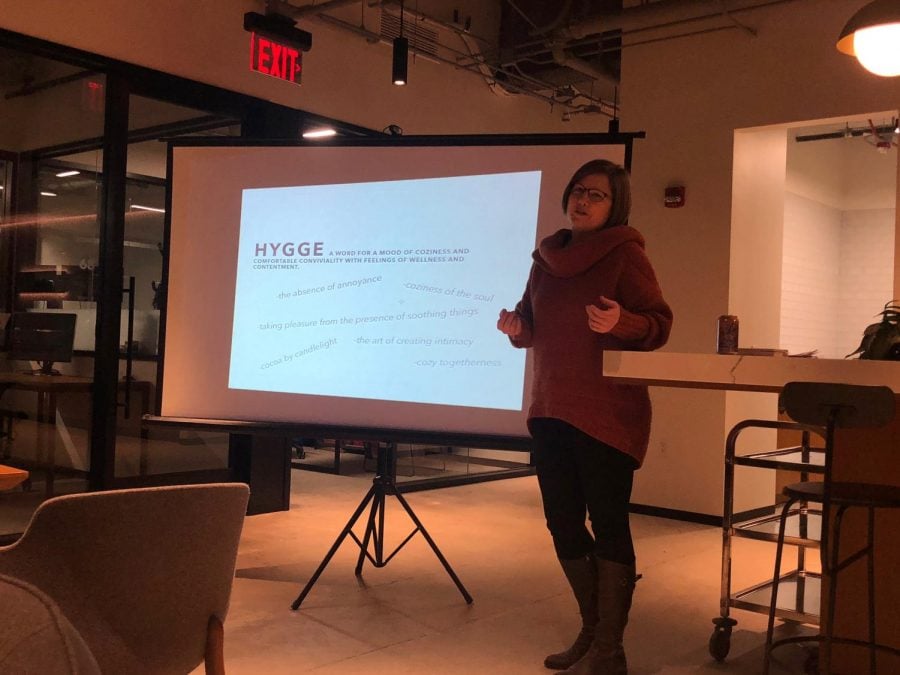Marriage counselor recommends practice of hygge in relationships
Maddy Daum/The Daily Northwestern
Monica Isaac, a family, marriage and individual counselor, speaks at Hygge Fest. Isaac spoke about hygge in relationships and how to enjoy small everyday moments.
February 20, 2019
Monica Isaac, a family, marriage and individual counselor, offered a new take on relationship advice Tuesday night: to practice hygge through receptive listening, empathy and self-awareness.
Isaac spoke at shared office space Industrious Evanston, located at 909 Davis St., as a part of Downtown Evanston’s inaugural Hygge Fest. The hygge events will continue through Feb. 22., and focus on the Danish concept of coziness through daily lifestyle choices.
Isaac said that hygge is counter-cultural for Americans, who are less likely to factor happiness into their everyday activities. Isaac outlined three main areas of hygge in relationships — pleasure, presence and participation — which help individuals be present in the moment.
People often go through life “on autopilot” and hygge helps to focus on being present, Isaac said. Isaac said putting less emphasis on the things you are bad at and using your skills to help or relationships will produce a sense of belonging.
“Just focusing on the gifts that you have and the things that you do well,” Isaac said. “Then using that skill or gift for other people creates a domino effect of happiness and of being present.”
In relationships with spouses or friends, people continue to embody different roles within a family, Isaac said. Attachment theory explains how people bring issues with their family life into their adult relationships.
Isaac said self-awareness about attachment theory can allow both partners to be more present. She said reflexive listening, which involves restating what the other person said, can help correct problems that arise from the psychological phenomenon.
“Choose to be there and engage the person in a different way, really listen and try to see how is this person different than the role that (you are) usually in,” Isaac said. “That can really help create a different way of being in relationship with people.”
Annie Coakley, the executive director of Downtown Evanston , said she spent last summer in Denmark and picked up on elements of their culture that contribute to Hygge. She said that the most Hygge thing you can do in a relationship is share experiences.
She said that in Denmark, potluck dinners on Friday nights are an example of hygge. Attendees cannot talk about politics or other polarizing topics and focus on shared stories.
“It’s going to be something almost impossible for us to just turn around and be 100 percent hygge but the shared experience of eating and talking about things that you are not used to talking about… that aren’t your children, your spouse, your work,” Coakley said.
Evanston resident Kerrigan McCarthy said that he has been told that the way he lives his life is similar to hygge and came to the event to do more research into the concept. He said that he is looking to strengthen the parts of himself that already embody hygge.
McCarthy was looking to delve more into the hygge community and said that he found better dialogue to share it more efficiently.
“(The presentation) had some really great things mentioned but there wasn’t a real solid thread to follow,” McCarthy said. “I definitely enjoyed the presence of the presenter … you could tell that she was interested in the concept but also seemed very fresh to the concept.”
A previous version of this article misattributed comments to Katrina Meckes. It was Annie Coakley, the executive director of Downtown Evanston, who said it would be “almost impossible for us to just turn around and be 100 percent hygge.” The Daily regrets the error.
Email: [email protected]


